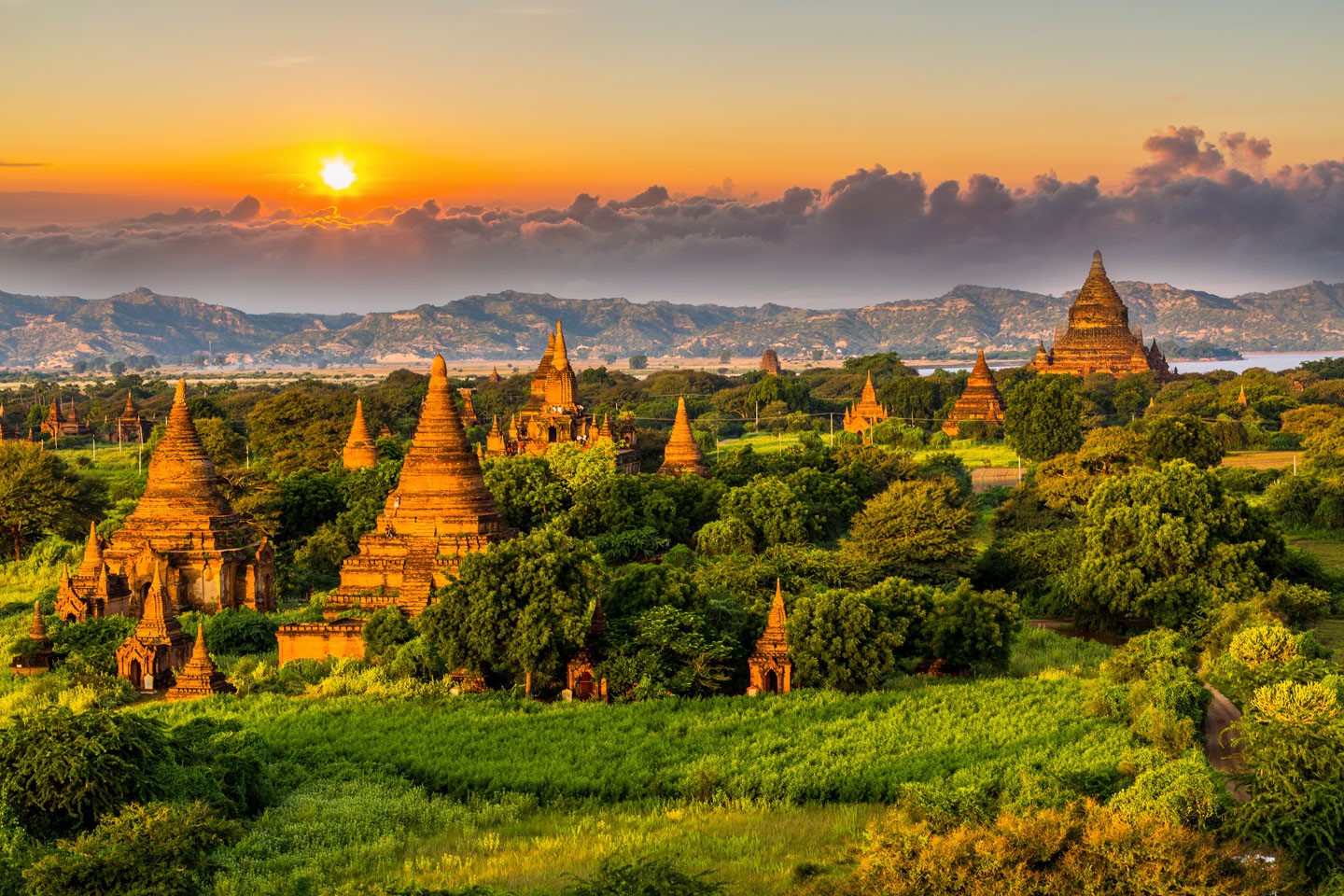
February 1, 2021. The metropolis of Yangon, the former capital of Myanmar, wakes up under a stormy sky: the leader and icon Aung San Suu Kyi is arrested along with President Win Myint. The coup organized by the army brings General Min Aung Hlaing to power. It is the sudden interruption of a dream: Myanmar had embarked on the path of democracy and left behind several bitter dictatorships that have followed one another since 1962. People take to the streets, the police shoot, bat, torture – we are back to years darker than the bloody dictatorships of the past.
A horrible but well-known scenario which fortunately resists a population prepared for any repression, which demonstrates that it will not accept old and new torturers. We all think so at first glance. The truth is different: in Myanmar, there is no military coup against democracy, but an internal settlement between mafia gangs, each with its own representation both in politics and in the army, that the population perceives as an annoying whirlwind of insects disrupting the struggle between two of the corrupt power systems, which in turn believe they can compete for a very wealthy country as if we were still in the deep Middle Ages.
A few years ago, former mafia boss Than Shwe had reached his 80th birthday, gave the Burmese some semblance of democracy in return for his family being forever safe and able to continue to grow and grow. thrive in the new national order. This former mafia boss was convinced that his best ally, icon and Nobel laureate Aung San Suu Kyi, would fight for him in order to convince industries, banks and trading companies around the world to come to Myanmar and to build a roadblock against them to build other mafia leaders, both in the army and at the top of rebel ethnic groups and at the top of international criminal organizations. He was wrong. And it is a mistake that kills thousands of innocent people.
A dramatic story
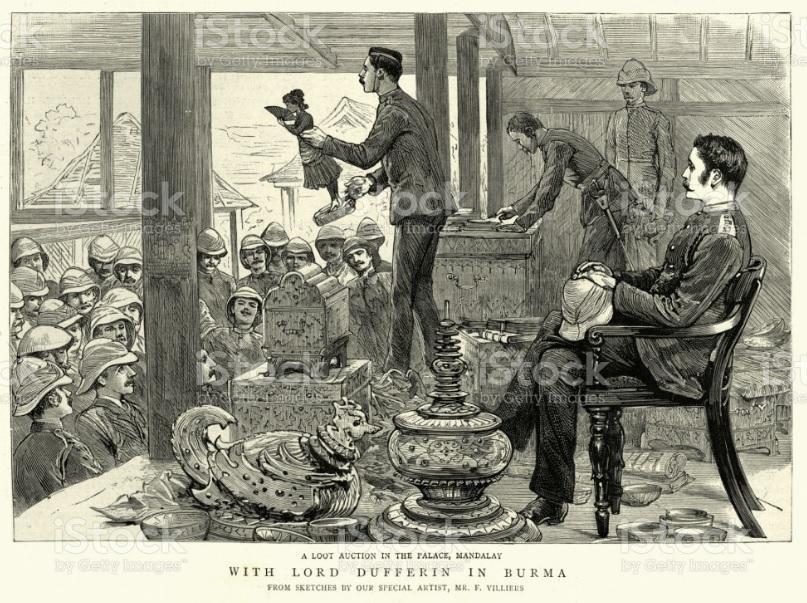
Lithograph from an auction of spoils of war captured by British invaders in Mandalay
Myanmar – or Burma, before the government’s military junta changed its name on June 18, 1989 – is a country populated by around 140 ethnic groups, fewer than 60 million people[1], each with a wealth of complex histories and fascinating, myths and traditions, as well as with more than a hundred different languages[2]. More than two thousand structures, including temples, monasteries and pagodas – it is believed that there were at least 13 thousand once – represent a monumental heritage unique in the world[3]. Nestled between India and China, Myanmar is surrounded by high mountains that can reach 5,600 meters high[4], then descend into a plateau rich in rubies, sapphires and other precious stones as well as silver, lead and zinc[5].
Burma experienced a century of British colonization[6] when World War II broke out and was “liberated” with the help of the Burmese Independence Army trained by the forces of the Rising Sun who have secretly invaded the country since the Thailand by conquering Yangon and the “Burma Highway” – a 1,154 km route connecting Lashio, Burma, to Kunming, China[7] – depriving the Chinese of their only supply route and forcing the British to retreat.[8] 13,463 British and Burmese and 4,597 Japanese died[9]. But the Japanese presence proves that it is worse than the British colonization, where people of all languages, religions and ethnicities learned to feel Burmese and to defend the same cause[10] until 1945 under the coordination of the AFPFL (Antifascist People’s Freedom League[11]) under the leadership of Aung San it was the British who helped the Burmese to freedom[12].
In December 1946, a delegation of Aung San and his rival U Saw went to London and negotiated the transfer of full sovereignty to a Burmese government through the mediation of British Prime Minister Clement Attlee[13]. But on July 19, 1947, Aung San and seven members of his government were assassinated by political opponents led by U Saw during a government council meeting[14]. The massacre does not turn into a coup: U Saw and his accomplices are tracked down, arrested and executed[15]. Thakin U Nu, President of the Constituent Assembly and Vice President of AFPFL, takes over as the new Prime Minister[16].
During his reign, U Nu will try to free the country from misery by creating a state economy based on the socialist model[17]. He remained at the top for ten years and, despite his political sense, will have a very hard life[18]: violent pro-Chinese uprisings, clashes between Karen, Mons and other ethnic groups[19], army mutinies, huge economic problems and all the rest. bureaucratic apparatus. back in Putting In Order, all the factors that will seriously hamper its continued work aimed at stabilization[20]. And she has not yet accepted the arrogance of the military.
In 1962, General U Ne Win, commander of the Tatmadaw[21] (Burmese Armed Forces), organized a coup, arrested Prime Minister U Nu[22] and founded the Revolutionary Council of the Union of Burma, composed only of officers of the same Tatmadaw: constitution suspended, opposition parties and free associations banned, gagged press, bitter offensives against rebel groups in the countryside, displaced foreigners, nationalization of the economy, hundreds of politicians imprisoned, severe repression against demonstrators – when the Yangon University students tried to demonstrate in July 1962[23], the regime reacted harshly: Tens of thousands dead and thousands of students arrested[24] followed by complete diplomatic and economic isolation from the rest of the world[25].
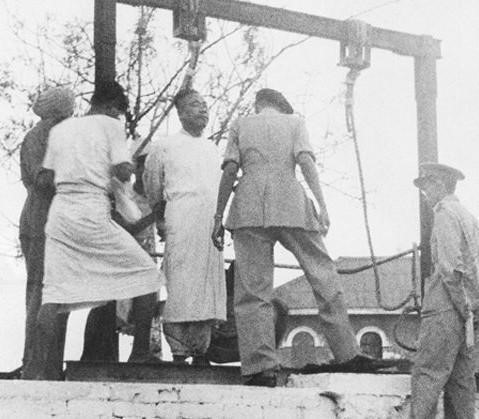
May 1948: U Saw hanged for the murder of Prime Minister Aung San
As soon as the Revolutionary Council is in power, the “Burmese road towards socialism” opens[26], a sort of alchemy between Marxism and Buddhism[27], which will lead to a strong reversal of the path of modernization taken by U Nu. Ne Win because he deserves the nickname “Destroyer of Burma”[28]. In reality, Ne Win wants to enshrine the identity between Tatmadaw and the institutions in the constitution[29]. The new “Socialist Republic” in 1974 was a one-party state, the Burmese Socialist Program Party (BSPP[30]), led by army generals[31] who brutally cracked down on the governance of public affairs[32].
Over the years, the Burmese people have been exhausted, starved, in search of peace and stability, but above all today they realize the abysses into which the country has plunged. It is the fertile nursery from which an imposing civil rebellion started. The protests, largely due to a demonetization operation[33] that burns the life savings of citizens, begin with students who can no longer afford their tuition fees and spread like wildfire to all walks of life in the following years[34].
The Bloody Uprising 8888
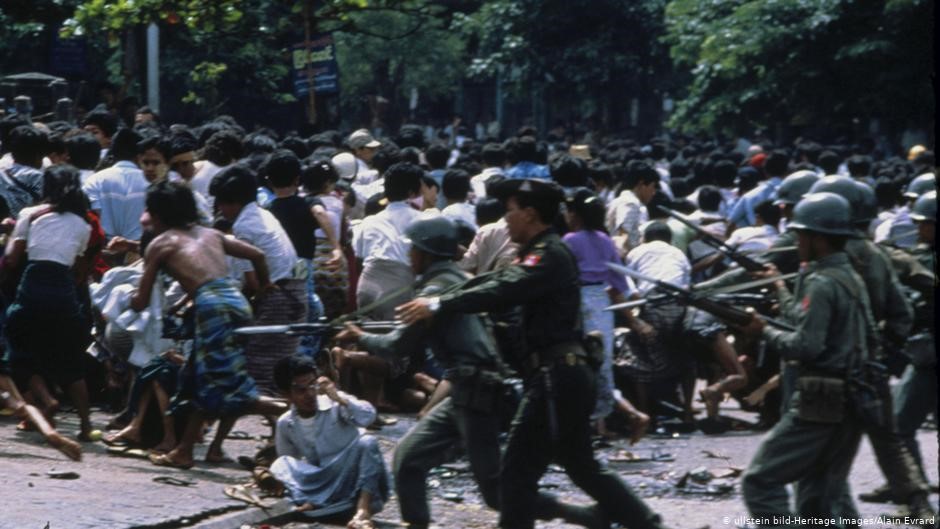
March 1988: Thousands of police murders during protests [35]
The spark erupted in March 1988 when a group of students from a teahouse near Insein, north of Rangoon, argued with another group of young people from a neighborhood near campus. The police intervene and make arrests, but the next day the boy suspected of being the instigator of the fight, the son of a local official, is released[36]. The fact unleashed the anger of the students who triggered other struggles with the local populations. Police attack campus with riot cordon, fire tear gas and open fire: Fifth-year chemistry student Ko Phone Maw is killed[37].
Anger is growing: on March 11, thousands of students marched around the Rangoon Institute of Technology (RIT) and the University of Rangoon. Police storm the campus and arrest hundreds of students[38]. On March 16, a thousand demonstrators marching on Pyay Road were surrounded and attacked by Lon-Htein battalions – one of the special forces of the Burmese police[39]. About 200 students were killed, beaten to death and drowned in nearby Lake Inya in a massacre known today as the “White Bridge Incident”[40].
Protests are increasing, forcing the army to intervene on a daily basis in support of the police: violence and mass arrests are the only answer. On March 18, 41 students were suffocated in a police car while being transferred to Insein prison[41]. Universities are closed to prevent the organization of new demonstrations[42]. On June 15, amid the turmoil in the squares, the government was forced to impose a curfew as arrests continue. On June 21, a demonstration led by Buddhist monks was suffocated in blood: 20 police officers and a hundred civilians were killed in the clashes[43].
The whole country is out of control: in the face of chaos and the apparent inability to cope with the situation, U Ne Win is forced to withdraw from both the President of the Republic and the President of the BSPP in July 1988[44], appointing him to succeed him as his ally, General Sein Lwin[45], a hated student who has been accused of killing civilian protesters in the bloody crackdown of the past 20 years and whom people call “the butcher of Rangoon”[46] . His appointment only ignites the streets.
August 8, 1988 (8.8.88, this date has special significance according to Burmese numerology: 8 is considered the cosmic equilibrium number, so the date is auspicious) the largest general strike ever organized in Burma is called[47] . At 8 o’clock in the morning, the towns are inundated by hundreds of kilometers of demonstrators from all walks of life: workers, students, monks, women, civil servants, soldiers – all marching towards the large squares. Small gatherings are improvised all over the place. Brigadier General Myo Nyunt, responsible for martial law in Rangoon[48], sends troops from three infantry divisions for major protests. An hour before midnight, hell beats the crowd: the soldiers start shooting at random, and the massacre lasts until the next morning[49]. This time, the operation bears the indisputable signature of the army, the Tatmadaw.
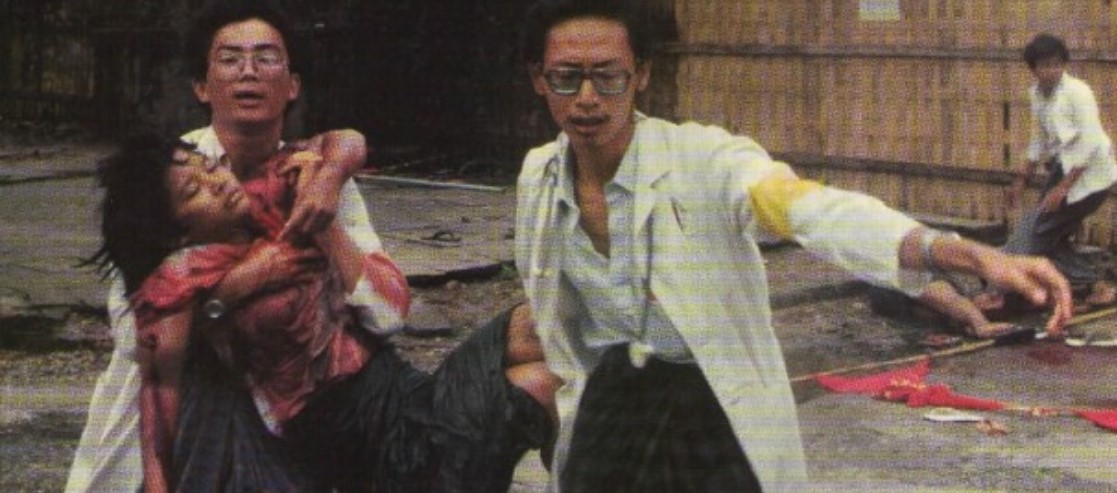
Medical student Win Zaw (left) and family doctor Dr. A saw Lwin transport Win Maw Oo, a 16-year-old pro-democracy protester, in an ambulance after being shot on September 18, 1988[50]
The protest does not subside[51]. On August 10, a Tatmadaw battalion, assisted by military intelligence (MI) agents, searched Rangoon General Hospital for hundreds of protesters, students and monks who had been wounded in the previous days; Doctors and nurses protest, but only receive bullets[52]. By the end of the raid, there are thousands of deaths inside and outside the hospital[53]. Counting them is impossible: hundreds of corpses were loaded into their trucks by the army and cremated in the barracks. According to one estimate (Amnesty International, 1990; US Congress, 1990), the death toll is at least 3,000, but some speak of as many as 10,000[54]. 3,000 others end up in prison and around 10,000 activists flee the country[55].
General Sein Lwin is due to step down as both head of state and BSPP chairman on August 13[56], and his post will be taken over by Maung Maung, another man very close to Ne Win. Even the new name does not calm the spirits, on the contrary, it strengthens them[57]. To cool down opponents, democratic, fair and multi-party elections are promised – elections the current government thinks they are winning. A promise that is fulfilled as the events unfold.
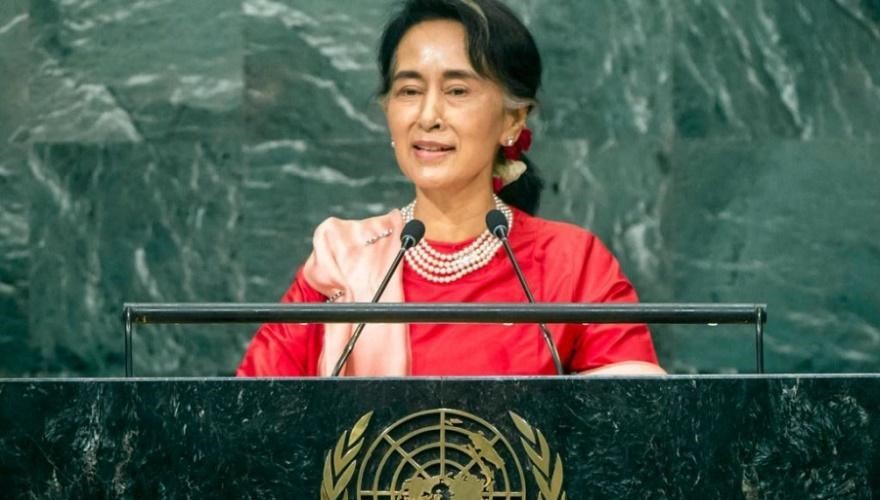
The “uncomfortable” Aung San Suu Kyi
The population is trying to organize: there are more than 200 registered parties, including the National League for Democracy (NLD), led by Aung San Suu Kyi, daughter of Aung San, the former independence activist assassinated in 1947: born on June 19, 1945 at She was only two years old in Rangoon when her father was murdered[58]. She studied in Burma until 1960, when she followed her mother, ambassador to India. She graduated from Oxford University, got married and spent the 1970s and 1980s in England with her husband and two children[59]. In 1988, amid the unrest, she returned to Burma to help her sick and dying mother. She joined the opposition movement and quickly gained notoriety, in large part thanks to her innate charisma and the meaningful name of her father[60].
Meanwhile, the army continued the violent repression: on September 18, 1988, the Tatmadaw seized power with a coup led by General Saw Maung, introduced martial law and changed its name to the Council for the Restoration of Law. and Council for the Restoration of the State Legal Order (SLORC[61]). Aung San Suu Kyi, who was considered an opposition leader by the military, was placed under house arrest in 1989[62]. Elections were held in 1990 and the LND, a party founded in September 1988 of which Aung San Suu Kyi is general secretary[63], won a landslide victory and won 82% of the seats[64]. All useless: The SLORC, seeing the victory decline, occupying the streets with armored vehicles, declares to reject the result of the elections[65].
Led by Saw Maung and after 1992 by his deputy general Than Shwe, a symbol of popular terror, the SLORC abolished the 1974 constitution[66]. In 1997, he decided to change the name of SLORC to State Council for Peace and Development – SPDC, a body made up entirely of the military[67]. The name of the junta really seems to have been born from Orwell’s imagination, as the country has fallen back into barbarism[68]: unfortunately the Tatmadaw can kill and destroy but not build, and therefore any measure of economic recovery fails[69].
The rest of the world is not standing still: the European Union is blocking the sale or transfer of arms, weapons skills, or any support that could serve for internal repression in Burma[70]. The United States suspends investment and aid and, along with Australia, Canada and New Zealand, prohibits military or economic supplies to the regime, severing diplomatic relations[71]. China and Thailand are doing it and, surprisingly, Singapore too.
According to Jane’s Intelligence Review[72], a few ships unloaded hundreds of cases labeled “Allied Ordnance, Singapore” in the port of Rangoon in October 1988 containing mortars, ammunition and raw materials for Burmese armaments factories and ammunition from 84. mm for the Carl Gustav guns, which are delivered to the Burmese army[73]. This alliance is sealed by bilateral treaties which, despite the denial, strengthen the presence of Singapore in the control of Burma[74]. Singapore is currently one of the top investors in Burma with over $ 20.6 billion at an FDI (Foreign Direct Investment 2018-2019) index of 26%, and the investments are officially in real estate, communications, information and the production sector[75], but it is an investment without any transparency[76].
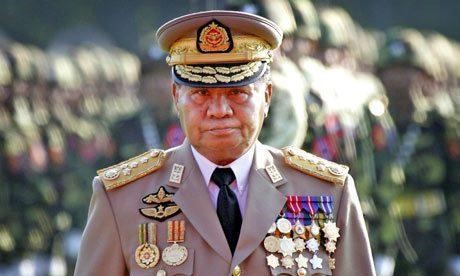
Than Shwe, showy ferocity, opulence and corruption
Although his name is not as well-known as that of Mobutu, Pol Pot or Adolf Hitler, Than Shwe is one of the most cruel dictators in history. Extremely introverted person who entrusts his most delicate decisions to astrology[77], and in more than thirty years in power, he employs the strategy of absolute impenetrability, guided by a mad vanity which manifested itself when he transferred the capital in Naypyidaw in 2006 (“Residence of the kings”), a city with an absurd plan, the fruit of his dreams and built by architects who followed orders without quarreling[78].
Than Shwe was born in Kyaukse, a village near Mandalay, in 1933 and was a postman as a child[79]. When Ne Win took power in 1962, he became the director of the Central School of Political Science in Phaung-gyi, near Yangon. Four years later he returned to the armed forces and, with a very rapid rise, took command of the infantry brigade, the division in which he began his military life; In 1985, he became Deputy Commander of the Army and Deputy Minister of Defense and, three years later, Vice-President of SLORC[80]. In 1992, four years after Saw Maung’s coup, he took over the presidency because, in his opinion, his predecessor was too weak and sick[81]. To rule Burma, Than Shwe wants even more violence.
On the one hand, when Shwe opened up Burma to capitalism, his management of power was terrifying: indiscriminate arrests, murders, rapes and sexual violence – both against boys and girls – civilians in chains, forced into military service, villages set on fire, hundreds of thousands of people displaced, tortured and killed in villages in retaliation against ethnic groups[82]. No interest for the opinion of the world: the refusal of Than Shwe in 2009 to accept that Ban Ki-Moon, the secretary general of the United Nations, meet Aung San Suu Kyi, still under house arrest[83], is emblematic of impermeability brutal at the, which is considered external interference. Burma was one of the first states to sign the Universal Declaration of Human Rights, but these are now forgotten things[84].
When his government starves the citizens, the general does not so much despise a very comfortable private life as his reputation for megalomania surpasses that of a cruel torturer[85]: when he gives a statue of Buddha to Shwedagon, in the most sacred pagoda of Rangoon, God has the face of a dictator[86]. Than Shwe amassed huge fortunes during his tenure, manipulated oil and gas contracts and, with his partner General Tin Aye, created a number of shell companies in tax havens[87]. Everything is simple: Burma does not submit an annual budget, nor the tax authorities, and justice is paid by the army[88]. In 2011, at the end of its mandate, Burma was ranked 180th among the most corrupt nations in the world according to Transparency International[89].
He had started earning money before taking power because the SPDC had given him 1,000 hectares of rubber plantations, two jade mines and a gold mine[90]. Subsequently, Treasury Department sources reported the transfer by the SPDC of some premises in Rangoon, Naypyidaw and Maymyo, as well as more than 30 vehicles registered in the name of Than Shwe’s children and grandchildren[91]. Nay Shwe Thway Aung, Than Shwe’s favorite nephew, buys several properties in Rangoon, one of which was owned by the Ministry of Industry on Kabaraye Pagoda Road[92]. Others belonging to the Ministry of Science and Technology, the Ministry of Atomic Energy and the Ministry of Industry, as well as the property of the Yankin Duty Free Market, fall into its hands[93].
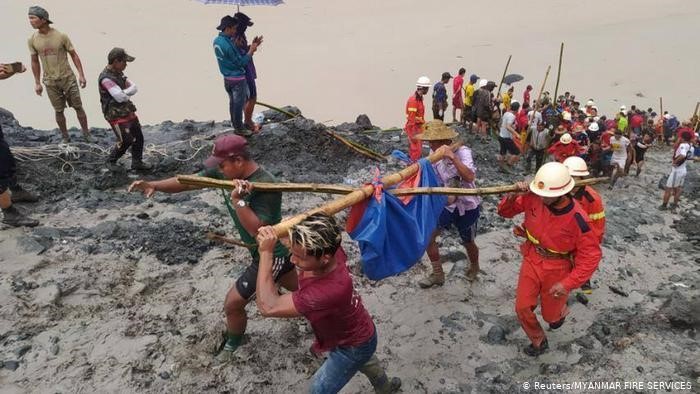
In the jade mines inherited from Than Shwe’s family, where people die from poor working conditions [94]
The general’s two sons, Kyaing San Shwe (active among other things in the illegal gambling sector[95]) and Htun Naing Shwe, control the permits of six jade mines in Hpakant, those which suffer the most inhuman treatment[96], in addition to the construction company Classic International Company[97]. Kyaing International[98] and the Myanmar Naing Workers’ Group[99] stop. Any license granted without any right[100]. Jade is Myanmar’s most valuable mineral resource, 70% of the world’s production is mined here.
A Global Witness poll shows that while Jade produced $ 31 billion, or 48% of Myanmar’s total GDP, in 2014 alone, almost none of that value reached the citizens and the treasury[101]: the Control of this sector is entirely in the hands of a network of military elites (the Tatmadaw), drug lords and international crime[102]. Global Witness also estimates that in 2014 alone, at least $ 220 million of that $ 31 billion ended up in the pockets of Shwe, his former Minister of Rural Development and Secretary General of the Union Solidarity and Development Party[103].
In 2006, a video circulated[104] which aroused the indignation of the Burmese[105]: the general attended the wedding of his daughter in a setting made of champagne, necklaces, gold, diamonds and silk. According to The Observer, the marriage is arranged and paid for by an organized crime boss, Lo Hsing Han[106]. He gritted his teeth as an opium trafficker and, under General Ne Win, became the leader of a special anti-Communist military unit, the Ka Kwe Ye (KKY)[107], a post that enabled him to become a figure of bow to the global heroin trade. Arrested in Thailand and sentenced to death in Myanmar, he was pardoned by Shwe in 1980, who then persuaded the head of the secret service Khin Nyunt to hire him as diplomatic mediator[108] so that he now enjoys diplomatic immunity for trafficking. drug[109].
In 1992, Hsing Han founded Asia World Company[110], a trading company suspected of recycling drug revenues[111]. His son Steven Law – aka Tun Myint Naing – and his wife become a true leader in the company and sign multi-million dollar contracts in the construction and energy sectors: In February 2008, the USA posed on blacklisted by the Treasury Department Lo Hsing Han, his son and his family with the 10 companies it controls in Singapore[112], but he continues to receive management contracts for ports, highways and airports in Burma[113].
Another ally engaged to one of the General’s daughters[114] is Tay Za, considered Myanmar’s richest man[115]. Born in Yangoon in 1964[116], he heads the HGC Htoo Group of Companies[117], the only private national airline Air Bagan[118] to own hotel, mining and exporting companies[119]. As the Burmese representative of the Russian military industry MAPO (Moscow Aircraft Production Association)[120] and the Russian helicopter company Rostvertol[121], Tay Za plays a crucial role as a consultant in the purchase of bombers and combat helicopters MiG-29 from Russia and small arms[122]. Thanks to Than Shwe, he also won the state contract for the construction of two hydropower plants[123].
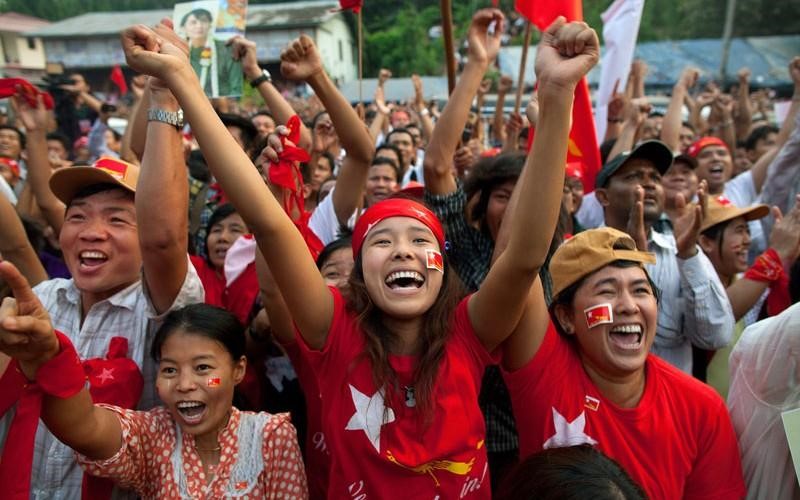
Nothing is forever
Until the old tyrant comes up with the idea of being democratically legitimized: Elections are scheduled for 2010 on the basis of the constitution which has been discussed for over 14 years and which only entered into force in 2008[124] . This provides that a quarter of the seats in the House of Commons and the entire House of Lords are reserved for the military and prohibits[125], under Article 59F, the candidacy of anyone with a spouse, child or foreign parent – a standard that was born in Beat Aung San Suu Kyi, who has an English husband and son, is particularly feared by the dictator[126].
The elections will take place on November 7, 2010, with very few incidents, only a 24 hour internet blockage a week before the elections[127]. 37 parties participate[128], but not Aung San Suu Kyi’s LND, which decides to boycott. The military (USDP) wins on charges of fraud, condemnation of the United States and applause from China and Russia[129]. On March 30, 2011, Than Shwe dissolved the SPDC (which merged with the USDP) and the military junta[130], and the first civilian government in nearly forty years was elected, led by Thein Sein: a Buddhist monk and former soldier who had resigned to lead the USPD[131]. He eases press restrictions, decides to release hundreds of political prisoners, makes agreements with certain ethnic rebels, rehabilitates Aung San Suu Kyi, which allows him to stand in the by-elections of 2012 and a seat among the 43 seats allocated . to his party to obtain, although more than 80% of the seats still remain in the hands of the USPD[132].
Thein Sein brings the country out of the economic crisis and diplomatic isolation[133]: in 2012 and 2014, he will receive Obama, in 2013 he will be welcomed in the USA[134]. Its decision to suspend the construction of the very competitive Myitsone dam is emblematic and prevents Chinese investors from building it: the action is warmly welcomed by public opinion[135]. Than Shwe seems to have disappeared into the shadows, although many believe he has secretly retained control of the Tatmadaw[136].
In the 2015 elections, Aung San Suu Kyi and the LND scored an exceptional victory, winning 392 of the 492 available seats and receiving 52.5% of the vote – 25% of the seats are still allocated to the unelected military[137]. However, Suu Kyi cannot be elected president due to article 59F of the Constitution[138]. On March 15, 2016, Htin Kyaw, a childhood friend of Suu Kyi, was elected president and will be the first elected leader to ever have a military background[139].
In the new government, Suu Kyi is first Minister of Foreign Affairs, then Minister to the Presidency and finally State Councilor, which allows her to try to end the ethnic uprisings with the Panglong peace conference in August 2016[140] . The attempt fails: only eight of the 18 armed groups that participated in it sign the peace agreement, and the Kachin Independence Organization (KIO), which controls smuggling and hydroelectric power plants, refuses to negotiate[141]. Then there is the delicate Rohingya issue, which will destroy Suu Kyi’s international image.
The persecution of the Rohingya
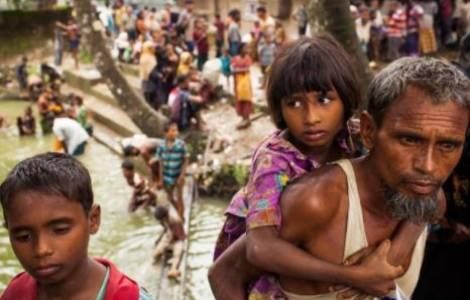
The Rohingya people on the run, pursued by Burmese troops
The hundreds of ethnic groups in Myanmar do not like the Rohingyas because they come from “outside”: they are settlers who came from the misery of the Gulf States and India from the 13th century[142]. These Muslims have always been persecuted by Burmese governments, with the exception of the U Nu government, which admitted participation in the government until its overthrow in 1962[143]. In propaganda and popular images, every Muslim is a terrorist, every Buddhist a pacifist[144]. The 1982 Citizenship Act, which officially designates 135 “national races”, excludes the Rohingya and calls them “Bangladeshi” invaders from Bangladesh[145].
Government-led genocidal operations are numerous and bear evocative and terrifying names. Here are some of them: 1959: Shwe Kyi (Pure Gold); 1966 Kyi Gan (crow); between 1967 and 1971 Ngazinka (Conqueror) and Myat Mon (Great Purity); 1973 Major Aung Than (millions of shots); 1974 Sabae (cleanses and illuminates like a jasmine flower); from 1978 to 1979 Nagamin (Dragon King); 1991 Pyi Thaya (Clean and Beautiful Nation)[146]. The Tatmadaw’s strategy has always been the same: genocide. The Taungoo operation in May 2001 is emblematic, in which more than a thousand people led by Buddhist monks (including members of the Union Solidarity and Development Association (USDA) and employees of the military intelligence service ) attacked, destroyed and burned down shops. , the homes and mosques of dozens of Muslims and forced their families to leave the city[147], but the worst is yet to come.
In 2012, Harakah al-Yaqin was born, later renamed the Arakan Rohingya Salvation Army (ARSA), a shabby army armed only with bamboo sticks, knives and small homemade bombs[148]. In October 2016, the ARSA group, armed with slingshots and homemade knives, attacked the border police, stealing around 50 weapons and thousands of bullets from the guards – nine officers and twenty Rohingya were killed[149]. In November 2016, government sources reported clashes in which 69 insurgents and 17 police officers died and 234 people were arrested[150]. Aung San Suu Kyi’s government has described ARSA as a terrorist organization operating with Saudi and Pakistani support[151].
Clashes and raids are on the increase, killing hundreds. The UN reports that in the last four months alone, from August to November 2017, at least 290,000 Rohingya have been displaced and fled – more than 800,000 in 2021 – without water, food or medicine which reached Cox’s Bazaar in Bangladesh where they shelter there. They speak of violence, rapes, murders, burnt villages, but the allegations are rejected by the army, which says: “We are only fighting terrorists”[152]. On September 9, 2017, ARSA unilaterally proposed a ceasefire, but Aung San Suu Kyi’s government rejected the proposal[153].
She, who is the symbol of peace and democracy for millions of Burmese and for the whole world, has become the hope of a whole people who led peacefully against a bloodthirsty regime, for which she received the Nobel Prize. of Peace in 1991[154], is accused of guilty silence[155], although it is clear that she has no control over the military activities of Commander Min Aung Hlaing[156]. But if his silence is the first allegation, some behavior in 2019 will cast serious doubts on the transparency of his position: the International Criminal Court welcomes a petition against Myanmar on charges of genocide.
Aung San Suu Kyi travels to The Hague to personally defend the actions of the army, justify them as necessary and deny that they can be characterized as genocide[157]. He acknowledges that there may have been disproportionate military responses, but downplays the “bad apple” theory – a theory refuted by satellite imagery highlighting the systematic slaughter of entire Rohingya communities[158].
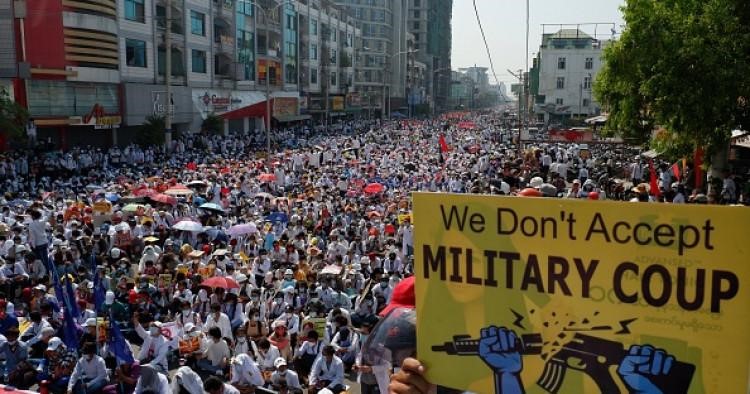
New move, old elite
The new legislative elections will take place in November 2020: Despite the tarnished image of the NLD and its leader, the USDP of the military suffers a new defeat: only 71 seats, 46 fewer than in the primaries, while the NLD in receives 920 out of a total of 1,117 places[159]. The USDP makes allegations of electoral fraud and calls for the cancellation and resumption of the vote[160]. But the Union Election Commission (UEC) rejects all allegations of fraud[161], despite threats from the Tatmadaw to intervene with a coup[162].
On February 1, 2021, the day when parliament should have met for the first time after the election, Tatmadaw’s troops ambushed Yangoon and arrested Aung San Suu Kyi, President Win Myint, and other LND leaders. A TV press release declaring a year-long emergency legitimizes armed intervention with alleged electoral fraud[163]. Here we go: The Tatmadaw, this time under the leadership of General Min Aung Hlaing, proves that she can speak only one language – that of indiscriminate violence and oppression.
But this time, the army must face a surprising and extraordinary popular mobilization which transcends ethnic, religious and class borders. Admittedly accomplices of digital platforms, in particular social networks, even if they are contaminated by Tatmadaw[164], the Burmese find a space of freedom, organize settlements and force Facebook to block accounts linked to the military[165]. In the aftermath of the coup, a massive civil disobedience movement formed called the “Spring Revolution”[166] and received broad international support[167]. Hundreds of protesters take to the streets at 8 p.m., beating pots and pans (a ritual that drives out evil spirits[168]), honking cars, ringing bikes and making noise to show solidarity[169].
Professional organizations also take to the streets, such as those of doctors, nurses and pharmacists known as the “Red Ribbon Revolution”[170], then workers and officials, students and teachers, intellectuals and monks, both Buddhists and Catholics; with the “Car breakdown” campaign, motorists and taxi drivers are organizing roadblocks that hamper the movement of military vehicles[171]. Social networks allow the birth of a national coordination, the MDP[172].
In April, the NUG National Unity Government was created[173], an organization that brings together all parties in the parliamentary arc, then the CRPH Committee representing Pyidaungsu Hluttaw[174] and the PDF People’s Defense Forces[175] were created, all organizations qualifying the terrorist regime[176] and which demonstrate that all ethnic groups united against a single common enemy: the Tatmadaw[177].
The “Stop Buying Junta Business” campaign was born, which affected the regime’s businesses and persuaded the US Treasury Department to embargo several companies affiliated with MEHL and MEC[178]. There are also Japan[179] and Great Britain[180]. Many private companies are responding to the boycott call[181], such as Thai Razer, which announces that it is withdrawing its investments from the Virginia Tobacco Company, a company with military ties[182], as are Korean steel companies and dozens of other multinationals in preparation for leave Myanmar[183]. Total continues to produce gas but refuses to pay taxes to the military and donates it to human rights organizations[184].
The Tatmadaw reacts with blind rage[185]: according to the AAPPBB (Burmese Association for Assistance to Political Prisoners), 870 civilians have been killed since the February 1 coup, including 58 children, plus 6,180 arrests, many convictions to death and torture, the number of which are beyond any lie of imagination[186]. But the population does not give in and returns to the streets every day to protest. Despite the disappointing and uncertain response from the Association of Southeast Asian Nations (ASEAN), things are moving forward[187]. A UN resolution is adopted, voted by 119 countries, only Belarus (China, Russia, India and 33 other countries abstain), which condemns the coup and calls for sanctions against Myanmar[188].
Who benefits from all this?
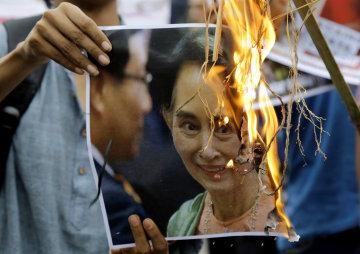
Muslim protesters in Calcutta burn poster with photo of Aung San Suu Kyi [189]
One of the first reactions of the international community, beyond the horror and the justified concern, was the surprise. The coup does not make sense in light of Myanmar’s history. There is a semblance of democracy in power, with a charismatic leader supporting nearly every post in the military. The Tatmadaw continues to enjoy impunity. No action has been taken against the MEC and MEHL (i.e. industries controlled by the military) or against parliamentary quotas for generals. In domestic politics, Aung San Suu Kyi was ready to burn her credibility to cover up the genocide of Muslims in Myanmar. The economy is booming, there are dozens of foreign companies that have invested and brought prosperity, there is no idea of the guests at the power banquet, and the people cheerfully applaud. And so?
Plus, the new powerful are all familiar faces. The new leader of the Tatmadaw is a general condemned by the United Nations Human Rights Council for genocide, crimes against humanity and war crimes in Rakhine, Kachin and Shan states[190], who, if he does not had not taken power, would have been (presumably) illegal because of his acquired property was taken into police custody. Until April, he would have been protected by the immunity reserved for army chiefs, but this month he is expected to retire and leave the door open to the curiosities of justice.
In addition, General Min Aung Hlaing takes over the management of the largest Burmese companies, MEC Myanmar Economic Corporation and MEHL Myanmar Economic Holdings Limited[191], two holding companies which have controlled the assets of the generals since 1990 and are exempt from audit and oversight in the mining industry (precious stones, oil, gas), but also in the banking, tourism and telecommunications sectors[192]. MEHL bought the port of Bo Aung Kyaw from the state for $ 44 million[193] and ceded it to the multinational KT Group for 70 years, settling for $ 3 million a year[194]. MEHL then controls one at Asia World Ltd.[195] and Adani Ports & SEZ Ltd[196]. Land leased along the river in the Township of Ahlone for the construction and operation of private ports[197].
The general shoots several jades and rubies through the broker KBZ[198], which pays minimal royalties to the government[199]. It also makes money from the Ever Flow River[200] and the Sagaing Copper Mine, which are famous for the environmental damage and suffering of workers and residents in the area[201]. Her son, Aung Pyae Sone, runs a thriving healthcare business, A&M Mahar[202]. In 2019, he acquired state land, where he opened an unlicensed restaurant and served alcohol (despite the bans)[203]. Since 2015, he has acquired land for the construction of a spring on 22.22 hectares of land without a permit[204] with his Sky One Construction[205]. He also received contracts to build hotels with Bhone Myat Pyae Sone Trading[206] and sell building materials[207].
The General’s wife, Myo Yadanar Htaik, is the director of Nyein Chan Pyae Sone Manufacturing & Trading Company[208] and Apower[209] in the real estate sector. His daughter Khin Thiri Thet Mon owns the film production company Seventh Sense[210] and has exclusive contracts[211] with Nay Toe, who plays a leading role in the commercialization of Mytel, the wireless operator that General Min Aung Hlaing founded with MEC and which owns shares held by the government. to be paid[212]. Khin Thiri Thet Mon also owns Everfit[213], a chain of luxury gyms. The United States Department of the Treasury for Foreign Assets Control (OFAC) sanctioned the general’s two sons and six companies they ran on March 10, 2021[214]. So the question is repeated: why a coup that costs so many lives but also causes very serious damage to assets and industries controlled by the military?
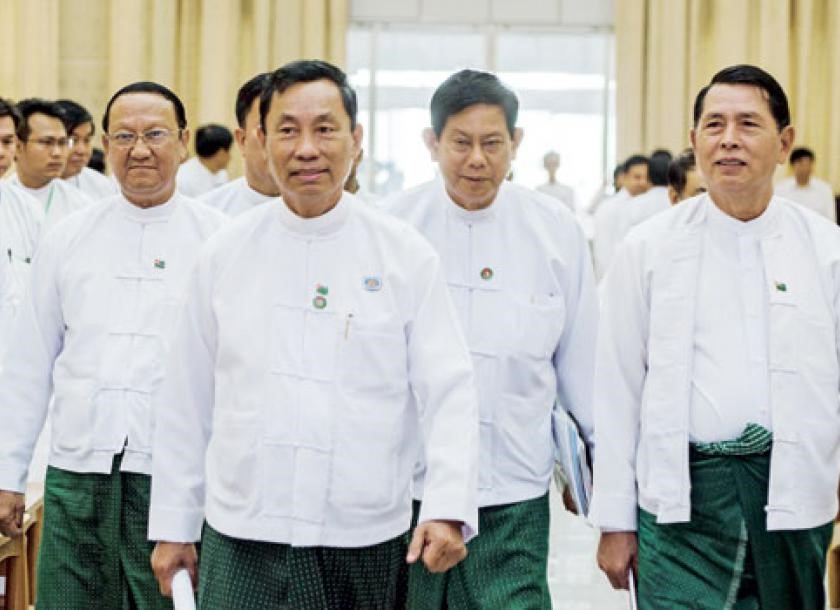
Shwe Mann (second from left) among the chiefs of his clan [215]
To find the answer, you have to go back to 2015 and one of the first decisions of the democratic government: the sale of part of MBL Myanmar Brewery Limited, which controls more than two-thirds of the beer and soda market in the country[216]. MBL is a joint venture with the Japanese group Kirin, which at the time acquired 55% of the capital of the Burmese company[217]. MEHL is secretly trying to increase the share capital in order to be able to buy back a stake of more than 50%, but the government blocks the project[218]. The government then blocked all shares of MEHL, which had tended to grow, but allowed Ever Flow River Group – a subsidiary of MEHL – to go public, allowing foreign capital to infiltrate the holding company’s financial system. military and to open the door to the sale of parts of MEHL and MEC[219] – a red warning sign for the military.
The Tatmadaw responded with criminal charges, and the government responded by investigating various entities affiliated with MEHL and MEC[220]. All this will be stopped by the coup, which also brings the Burmese economy back to self-sufficiency. Razer not only sells its stake in the entire Burmese tobacco market controlled by VTCL Virginia Tobacco[221]; The South Korean steel company Posco, which controlled all of Myanmar’s steel production in a joint venture ($ 1.8 billion in annual sales), announced that it would leave the choice to the junta: either Posco will buy back MEHL’s stake at face value, or Posco will close it, there will be no more steel in Myanmar[222]; the same threats come from Total, Chevron and other multinationals – and that brings us closer to the real answer to our question.
International sanctions and unilateral decisions by multinational companies hit MEC and MEHL – that is, the military – but do not intend to punish the population. Because the sanctions affect the energy supply, food, steel, banking and tourism, for the part (unfortunately the majority) controlled by the Tatmadaw. The value of these assets is declining, and the military is considering selling shares of companies affected by the sanctions – led by cadres within the Tatmadaw like Myint Swe, a former aide to Min Aung Hliang, head of the new regime, and interim president of Myanmar since February 1, 2021. He is Than Shwe’s grandson[223]. There are already companies ready to buy: Ayer Shwe Wah (controlled by Aung Thet Mann, son of entrepreneur Shwe Mann[224]), which would buy the energy sector[225], and RedLink Communications (controlled by Toe Naing Mann, another son by Shwe Mann[226]), which is tourism -, banking and telecommunications sectors[227].
On May 10, 2010, the European Union published by resolution 411/2010 a list of citizens of Myanmar, all members of the Shwe clan, who, according to the EU, are responsible for serious crimes against humanity and, therefore, title, are subject to sanctions that prohibit anyone in the EU from doing business with them, meeting them or facilitating them in any way. If you scroll down[228], you will find that most of them (there are 53 clan members) are not directly related to Founder Than Shwe, but to his cousin, former General Thura Shwe Mann, 74-year-old who in 2015 was ousted from the leadership of the Tatmadaw and its political bodies[229] after being for years the designated heir of Than Shwe[230]. Now, six years later, his family appears to be the only real coup. Serious reasons to wonder about the real reasons for this new regime and the future strategy of those who secretly pull the strings.
[1] https://minorityrights.org/country/myanmarburma/
[2] https://minorityrights.org/country/myanmarburma/
[3] https://www.myanmaronlinevisa.com/religion-temples-pagodas-monasteries/
[4] https://www.britannica.com/place/Mount-Hkakabo
[5] https://www.britannica.com/place/Shan-Plateau
[6] https://lostfootsteps.org/en/history/the-treaty-of-yandabo ; https://www.britishempire.co.uk/maproom/burma.htm
[7] https://www.britannica.com/topic/Burma-Road
[8] http://www.historyofwar.org/articles/campaign_burma_japanese.html
[9] http://www.historyofwar.org/articles/campaign_burma_japanese.html
[10] https://theconversation.com/myanmars-brutal-military-was-once-a-force-for-freedom-but-its-been-waging-civil-war-for-decades-158270
[11] https://www.britannica.com/biography/Aung-San#ref86515
[12] http://www.bbc.co.uk/history/worldwars/wwtwo/burma_campaign_01.shtml
[13] https://www.cvce.eu/content/publication/2015/10/19/cd1357f8-0e15-41a7-ae41-f39aa1a6db9b/publishable_en.pdf
[14] https://www.globalsecurity.org/military/world/myanmar/history-british-8.htm
[15] https://www.irrawaddy.com/specials/on-this-day/day-prime-minister-british-burma-hanged.html
[16] https://www.sjsu.edu/faculty/watkins/burma2.htm
[17] https://biography.yourdictionary.com/u-nu
[18] https://www.culturalsurvival.org/publications/cultural-survival-quarterly/burma-and-world-war-ii
[19] https://www.theguardian.com/news/2002/dec/06/guardianobituaries
[20] https://biography.yourdictionary.com/u-nu
[21] https://www.burmalibrary.org/en/myanmar-armed-forces-tatmadaw
[22] https://www.britannica.com/biography/U-Ne-Win
[23] https://www.uy.edu.mm/yangon-university/
[24] https://www.irrawaddy.com/specials/places-in-history/myanmars-destroyed-heritage-rangoon-university-student-union.html
[25] https://www.theguardian.com/news/2002/dec/06/guardianobituaries
[26] https://www.sciencedirect.com/science/article/abs/pii/0305750X81900437
[27] https://theconversation.com/myanmar-coup-how-the-military-has-held-onto-power-for-60-years-154526
[28] https://www.irrawaddy.com/specials/on-this-day/day-destroyer-burma-died.html
[29] https://online.ucpress.edu/as/article-abstract/4/2/716/22751/First-Steps-on-the-Burmese-Way-to-Socialism?redirectedFrom=fulltext
[30] https://www.britannica.com/place/Myanmar/Government-and-society#ref509565
[31] https://www.britannica.com/place/Myanmar/Government-and-society#ref509565
[32] https://www.britannica.com/biography/U-Ne-Win#ref184528
[33] https://www.livemint.com/Sundayapp/LO3bemtSxzcHa2lodLxIDI/A-Ne-Win-situation-Burmas-three-demonetizations.html ; https://www.thehindubusinessline.com/economy/demonetisation-effect-cancelled-notes-still-sitting-heavy-in-myanmars-purse/article9962585.ece ; https://www.iseas.edu.sg/images/pdf/TRS6_19.pdf “Military Capitalism in Myanmar: Examining the Origins, Continuities and Evolution of “Khaki Capital” – Gerard Mccarthy – ISEAS – 2019 – page 49
[34] https://www.sciencespo.fr/mass-violence-war-massacre-resistance/en/document/repression-august-8-12-1988-8-8-88-uprising-burmamyanmar.html
[35] https://www.dw.com/en/the-uprising-of-1988/a-17005335
[36] https://www.sciencespo.fr/mass-violence-war-massacre-resistance/en/document/repression-august-8-12-1988-8-8-88-uprising-burmamyanmar.html
[37] http://myanmarpedia.blogspot.com/2010/07/portrait-of-phone-maw.html
[38] https://www2.irrawaddy.com/article.php?art_id=185
[39] https://www.griffith.edu.au/__data/assets/pdf_file/0032/436874/Selth-Regional-Outlook-Paper-32-web.pdf “Burma Police’s Force: continuities and contradictions” – Griffit Asia Insitute, Andrew Selt – Paper n° 32 2011 – page 11
[40] https://www.irrawaddy.com/specials/on-this-day/white-bridge-ran-red-students-blood.html
[41] https://apnews.com/article/a225aa98c39926e67e664a596e9b1577
[42] https://www.sciencespo.fr/mass-violence-war-massacre-resistance/en/document/repression-august-8-12-1988-8-8-88-uprising-burmamyanmar.html
[43] https://www.refworld.org/pdfid/4f42061b2.pdf page 2
[44] https://www.latimes.com/archives/la-xpm-1988-08-13-mn-158-story.html
[45] https://www.latimes.com/archives/la-xpm-1988-08-13-mn-158-story.html
[46] https://www.irrawaddy.com/specials/on-this-day/day-u-sein-lwin-began-17-day-presidency.html
[47] https://www.sciencespo.fr/mass-violence-war-massacre-resistance/en/document/repression-august-8-12-1988-8-8-88-uprising-burmamyanmar.html
[48] https://www.sciencespo.fr/mass-violence-war-massacre-resistance/en/document/repression-august-8-12-1988-8-8-88-uprising-burmamyanmar.html
[49] https://www.sciencespo.fr/mass-violence-war-massacre-resistance/en/document/repression-august-8-12-1988-8-8-88-uprising-burmamyanmar.html
[50] https://www.irrawaddy.com/from-the-archive/from-the-archive-the-heroic-medics-of-the-8888-uprising.html
[51] https://www.sciencespo.fr/mass-violence-war-massacre-resistance/en/document/repression-august-8-12-1988-8-8-88-uprising-burmamyanmar.html
[52] https://www.hrw.org/news/2013/08/06/burma-justice-1988-massacres ; https://www.irrawaddy.com/from-the-archive/from-the-archive-the-heroic-medics-of-the-8888-uprising.html
[53] https://www.hrw.org/news/2013/08/06/burma-justice-1988-massacres ; https://www.irrawaddy.com/from-the-archive/from-the-archive-the-heroic-medics-of-the-8888-uprising.html
[54] https://www.mmtimes.com/news/8888-uprising-unfinished-revolution.html
[55] https://www.npr.org/2013/08/08/209919791/as-myanmar-opens-up-a-look-back-on-a-1988-uprising
[56] https://www.latimes.com/archives/la-xpm-1988-08-13-mn-158-story.html
[57] https://library.fes.de/libalt/journals/swetsfulltext/17768953.pdf – Refugee Review Tribunal AUSTRALIA – “Research Response Number”: MMR35154 – 29-07-2019 – page 3
[58] https://burmacampaign.org.uk/about-burma/a-biography-of-aung-san-suu-kyi/
[59] https://burmacampaign.org.uk/about-burma/a-biography-of-aung-san-suu-kyi/
[60] https://burmacampaign.org.uk/about-burma/a-biography-of-aung-san-suu-kyi/
[61] https://www.jstor.org/stable/27912129?seq=1 “Southeast Asian Affair” 1995 – R. H. Taylor page 241
[62] https://burmacampaign.org.uk/about-burma/a-biography-of-aung-san-suu-kyi/
[63] https://burmacampaign.org.uk/about-burma/a-biography-of-aung-san-suu-kyi/
[64] https://burmacampaign.org.uk/about-burma/a-biography-of-aung-san-suu-kyi/
[65] https://library.fes.de/libalt/journals/swetsfulltext/17768953.pdf
[66] https://www.amnesty.org/download/Documents/152000/asa160141998en.pdf – “Myanmar
1988 to 1998 Happy 10th Anniversary? A Chronology of Events”- Amnesty International – May 1998 – page 2
[67] https://www.refworld.org/docid/3df097254.html
[68] https://newint.org/features/2008/04/18/history
[69] https://www.burmalibrary.org/reg.burma/archives/199803/msg00280.html – Jane’s Intelligence Review – 1 marzo 1998
[70] https://www.reuters.com/article/us-myanmar-sanctions-factbox-idUSTRE57C2YJ20090813
[71] https://www.reuters.com/article/us-myanmar-sanctions-factbox-idUSTRE57C2YJ20090813
[72] https://www.burmalibrary.org/reg.burma/archives/199803/msg00280.html
[73] https://www.burmalibrary.org/reg.burma/archives/199803/msg00280.html
[74] https://www.burmalibrary.org/reg.burma/archives/199803/msg00280.html
[75] https://www.enterprisesg.gov.sg/media-centre/news/2019/june/singapore-is-largest-investor-in-myanmar
[76] https://www.smh.com.au/business/singapore-a-friend-indeed-to-burma-20071001-gdr8ha.html
[77] http://press-files.anu.edu.au/downloads/press/p102401/pdf/ch032.pdf page 3
[78] https://www.theguardian.com/cities/2015/mar/19/burmas-capital-naypyidaw-post-apocalypse-suburbia-highways-wifi
[79] https://www.britannica.com/biography/Than-Shwe
[80] https://www.britannica.com/biography/Than-Shwe
[81] https://www.treccani.it/enciclopedia/than-shwe/
[82] https://www.theguardian.com/world/2010/mar/11/burmese-army-violence-civilians-un
[83] https://news.un.org/en/story/2009/07/305612-myanmars-human-rights-record-matter-grave-concern-says-ban
[84] https://www.un.org/en/about-us/universal-declaration-of-human-rights
[85] https://www.theguardian.com/world/2007/oct/07/burma.peterbeaumont
[86] https://myanmar-now.org/en/news/buddha-statue-that-looks-like-former-dictator-than-shwe-to-be-fixed-or-removed-from-shwedagon
[87] https://www.asiasentinel.com/p/burma-end-of-an-era-or-a-dynastys-beginning ; https://www.burmalibrary.org/docs13/Burmas_Resource_Curse(en)-red.pdf “Burma’s
Resource Curse -The case for revenue transparency in the oil and gas sector” Arakan Oil Watch – March 2012 – page 5
[88] https://www.acc.org.bt/?q=node/1007
[89] https://www.transparency.org/en/cpi/2011?
[90] https://www2.irrawaddy.com/article.php?art_id=21071
[91] https://www2.irrawaddy.com/article.php?art_id=21071
[92] https://www2.irrawaddy.com/article.php?art_id=21071
[93] https://www2.irrawaddy.com/article.php?art_id=21071
[94] https://www.dw.com/en/mining-disasters-continue-in-myanmar-despite-regulations/a-54042106
[95] https://www.amazon.com/Than-Shwe-Unmasking-Burmas-Tyrant-ebook/dp/B00I47IXKA “Than Shwe: Unmasking Burma’s Tyrant” – Benedict Rogers – 2010
[96] https://www.hrw.org/news/2015/12/15/dispatches-greed-and-death-burmas-jade-mines
[97] https://mumbaimirror.indiatimes.com/news/world/the-3-powerful-men-blocking-vital-burma-aid/articleshow/15810274.cms
[98] https://opencorporates.com/companies/mm/872-2007-2008
[99] https://opencorporates.com/companies/mm/1859-2010-2011
[100] http://english.dvb.no/news/the-great-jade-robbery-burma-kachin-myanmar/58437
[101] https://www.globalwitness.org/en/campaigns/oil-gas-and-mining/myanmarjade/
[102] https://bylinetimes.com/2020/07/20/myanmars-shadow-industry-costs-more-lives-as-aung-san-suu-kyi-turns-another-blind-eye/
[103] https://bylinetimes.com/2020/07/20/myanmars-shadow-industry-costs-more-lives-as-aung-san-suu-kyi-turns-another-blind-eye/
[104] https://www.youtube.com/watch?v=TWj0tDpLAaI
[105] https://www.theguardian.com/world/2006/nov/02/burma.jonathanwatts
[106] http://www.owlapps.net/owlapps_apps/articles?id=3281452&lang=en
[107] http://gilioli.blogautore.espresso.repubblica.it/2007/09/28/chi-e-il-pinochet-birmano/
[108] http://edition.cnn.com/ASIANOW/asiaweek/98/0123/is1.html
[109] http://gilioli.blogautore.espresso.repubblica.it/2007/09/28/chi-e-il-pinochet-birmano/
[110] https://www.asiaworldcompany.com/
[111] http://edition.cnn.com/ASIANOW/asiaweek/98/0123/is1.html ; https://www.theguardian.com/world/2013/jul/07/godfather-heroin-dies-burma
[112] https://www.treasury.gov/press-center/press-releases/Pages/hp837.aspx
[113] https://www.theguardian.com/world/2013/jul/07/godfather-heroin-dies-burma
[114] https://www2.irrawaddy.com/article.php?art_id=6834&page=2
[115] https://haleysheavenlyscents.com/tay-za-networth
[116] http://d33j9og3btpwwc.cloudfront.net/people/tay-za.html
[117] https://opencorporates.com/companies/mm/1411-2004-2005
[118] https://www.airbagan.com/
[119] https://htoo.com/ ; https://haleysheavenlyscents.com/tay-za-networth
[120] https://amp.blog.shops-net.com/28798789/1/aircraft-industry-of-russia.html
[121] https://www.helis.com/database/sqd/Rostvertol/
[122] https://www2.irrawaddy.com/article.php?art_id=6834&page=2
[123] https://www2.irrawaddy.com/article.php?art_id=17523
[124] https://www.hrw.org/report/2008/04/30/vote-nowhere/may-2008-constitutional-referendum-burma
[125] https://carnegieendowment.org/2015/05/06/constitutional-reform-and-general-election-in-myanmar-pub-60112
[126] http://news.bbc.co.uk/2/hi/asia-pacific/7338815.stm
[127] https://www.newmandala.org/the-significance-of-myanmar%E2%80%99s-2010-election/
[128] https://www.ide.go.jp/English/Research/Region/Asia/20110104.html
[129] https://www.theguardian.com/world/2010/nov/09/burma-usdp-wins-election
[130] http://www.asianews.it/news-en/Than-Shwe-dissolves-military-junta-as-Thein-Sein-becomes-Burmese-president-21166.html
[131] https://www.britannica.com/biography/Thein-Sein
[132] https://edition.cnn.com/2012/04/04/world/asia/myanmar-elections/index.html
[133] https://www.britannica.com/biography/Thein-Sein
[134] https://www.frontiermyanmar.net/en/thein-sein-a-presidential-timeline/
[135] https://thediplomat.com/2019/03/myanmars-myitsone-dam-dilemma/
[136] http://www.asianews.it/news-en/Than-Shwe-dissolves-military-junta-as-Thein-Sein-becomes-Burmese-president-21166.html
[137] https://www.bbc.com/news/world-asia-33547036
[138] https://globalriskinsights.com/2015/10/three-weaknesses-of-the-myanmar-nld-party/
[139] https://www.bbc.com/news/world-asia-35808921
[140] https://www.reuters.com/article/us-myanmar-politics-peace-idUSKCN1160RF
[141] https://theglobalobservatory.org/2016/08/myanmar-21st-century-panglong-aung-san-suu-kyi/
[142] https://ilmanifesto.it/myanmar-la-persecuzione-rohingya-da-un-regime-allaltro/
[143] https://ilmanifesto.it/myanmar-la-persecuzione-rohingya-da-un-regime-allaltro/
[144] https://ilmanifesto.it/myanmar-la-persecuzione-rohingya-da-un-regime-allaltro/
[145] https://burmacampaign.org.uk/media/Myanmar%E2%80%99s-1982-Citizenship-Law-and-Rohingya.pdf
[146] https://thewire.in/rights/neither-clean-nor-beautiful-a-rohingya-in-myanmar-speaks
[147] https://www.hrw.org/legacy/backgrounder/asia/burma-bck4.htm
[148] https://www.aljazeera.com/news/2017/9/13/arsa-who-are-the-arakan-rohingya-salvation-army
[149] https://www.bbc.com/news/world-asia-37601928
[150] https://www.reuters.com/article/myanmar-rohingya-idINKBN13A11N?edition-redirect=in
[151] https://www.crisisgroup.org/asia/south-east-asia/myanmar/283-myanmar-new-muslim-insurgency-rakhine-state ; https://sg.news.yahoo.com/rohingya-militants-rakhine-saudi-pakistan-135712056.html
[152] https://www.bbc.com/news/world-asia-41214057
[153] https://www.bbc.com/news/world-asia-41214057
[154] https://www.nobelprize.org/prizes/peace/1991/kyi/facts/
[155] https://www.bbc.com/news/world-asia-41187517
[156] https://www.nbcnews.com/news/world/aung-san-suu-kyi-s-reputation-marred-myanmar-s-rohingya-n798541
[157] https://www.tandfonline.com/doi/full/10.1080/10357718.2020.1813251
[158] https://www.tandfonline.com/doi/full/10.1080/10357718.2020.1813251
[159] https://www.tandfonline.com/doi/abs/10.1080/03068374.2021.1886429?journalCode=raaf20
[160] https://www.tandfonline.com/doi/abs/10.1080/03068374.2021.1886429?journalCode=raaf20
[161] https://www.irrawaddy.com/news/burma/myanmar-election-body-rejects-military-allegations-electoral-fraud.html
[162] https://www.irrawaddy.com/in-person/interview/myanmar-religious-political-figures-respond-to-perceived-threat-of-military-coup.html
[163] https://www.reuters.com/article/us-myanmar-politics-military-text/statement-from-myanmar-military-on-state-of-emergency-idUSKBN2A11A2
[164] https://www.crisisgroup.org/asia/south-east-asia/myanmar/314-myanmars-military-struggles-control-virtual-battlefield
[165] https://www.channelnewsasia.com/news/commentary/myanmar-coup-army-protest-death-violence-activism-ngo-media-14524064
[166] https://www.straitstimes.com/asia/se-asia/myanmars-internet-goes-down-for-third-night-running
[167] https://globalvoices.org/special/myanmar-spring-revolution-2021/
[168] https://www.npr.org/2021/02/05/964358070/journalist-in-myanmar-recounts-ongoing-military-coup
[169] https://www.lowyinstitute.org/the-interpreter/importance-myanmar-s-pots-and-pans-protests
[170] https://www.dw.com/en/myanmar-doctors-and-nurses-stage-dawn-rally-against-coup/a-56944714 ; https://www.irrawaddy.com/news/burma/myanmars-medics-launch-civil-disobedience-campaign-coup.html
[171] https://www.straitstimes.com/asia/se-asia/myanmars-internet-goes-down-for-third-night-running
[172] https://www.frontiermyanmar.net/en/how-the-cdm-can-win/
[173] https://www.rfa.org/english/news/myanmar/crph-government-04162021185851.html
[174] https://www.rfa.org/english/news/myanmar/crph-government-04162021185851.html
[175] https://thediplomat.com/2021/05/can-myanmars-new-peoples-defense-force-succeed/
[176] https://www.irrawaddy.com/news/burma/myanmar-junta-declares-national-unity-government-crph-defense-forces-as-terrorist-groups.html
[177] https://www.france24.com/en/asia-pacific/20210414-myanmar-ethnic-groups-unite-in-fight-against-army-sights-set-on-federal-rights ; https://myanmar-now.net/en/news/rakhine-nationalist-group-joins-knu-in-fight-against-military?page=4&width=500&height=500&inline=true
[178] https://www.reuters.com/world/asia-pacific/us-blacklists-two-myanmar-military-controlled-companies-us-treasury-2021-03-25/
[179] https://www.reuters.com/article/myanmar-politcs-kirin-idUSL1N2KB04F
[180] https://www.arabnews.com/node/1842531/world
[181] https://www.ft.com/content/cfb6757d-d9d0-4fec-9ec5-ba62b6046a8b
[182] https://www.aljazeera.com/economy/2021/2/9/singapore-businessman-will-end-army-linked-myanmar-investment
[183] https://www.ft.com/content/13c27ea1-d0eb-4652-be6c-4426977b043a
[184] https://www.arabnews.com/node/1842531/world
[185] https://www.bbc.com/news/world-asia-56546920
[186] https://aappb.org/?p=15937
[187] https://www.amnesty.org/en/latest/news/2021/06/myanmar-aung-san-suu-kyi-goes-on-trial-asean-indecision-enabling-military-rampage/
[188] https://www.dw.com/en/un-calls-for-arms-embargo-against-myanmar/a-57961260
[189] https://www.nbcnews.com/news/world/aung-san-suu-kyi-s-reputation-marred-myanmar-s-rohingya-n798541
[190] https://www.bbc.com/news/world-asia-55892489
[191] https://www.justiceformyanmar.org/stories/who-profits-from-a-coup-the-power-and-greed-of-senior-general-min-aung-hlaing ; https://www.justiceformyanmar.org/stories/how-business-finances-the-crimes-of-the-myanmar-military
[192] https://www.taiwannews.com.tw/en/news/4172575 ; https://www.justiceformyanmar.org/stories/who-profits-from-a-coup-the-power-and-greed-of-senior-general-min-aung-hlaing
[193] https://www.irrawaddy.com/news/latest-news/military-owned-firm-buys-rangoon-port-terminal.html
[194] https://www.myanmar-now.org/en/news/british-company-runs-yangon-port-that-earns-myanmar-military-3m-a-year
[195] https://www.asiaworldcompany.com/
[196] https://www.adaniports.com/
[197] https://www.justiceformyanmar.org/stories/who-profits-from-a-coup-the-power-and-greed-of-senior-general-min-aung-hlaing
[198] https://myanmareiti.org/files/uploads/mehl_information_data_for_eiti.pdf
[199] https://www.justiceformyanmar.org/stories/who-profits-from-a-coup-the-power-and-greed-of-senior-general-min-aung-hlaing
[200] https://www.justiceformyanmar.org/stories/yangon-stock-exchange-listed-logistics-conglomerate-to-enrich-myanmar-military
[201] https://myanmareiti.org/files/uploads/mehl_information_data_for_eiti.pdf ; https://www.justiceformyanmar.org/stories/who-profits-from-a-coup-the-power-and-greed-of-senior-general-min-aung-hlaing
[202] https://uploads-ssl.webflow.com/5e691d0b7de02f1fd6919876/6050467c58253a56c9db6448_A%20%26%20M%20MAHAR%20COMPANY%20LIMITED.pdf
[203] https://www.myanmar-now.org/en/news/military-chiefs-son-paid-very-low-rent-for-his-upscale-restaurant-on-government-owned-land?page=79
[204] https://illinoisnewstoday.com/how-did-the-story-of-economic-profit-bring-about-a-coup/59964/
[205] https://www.dica.gov.mm/sites/dica.gov.mm/files/document-files/mic_23-2015_m.pdf
[206] https://www.mmtimes.com/business/20338-state-owned-hotels-get-new-owners.html
[207] https://uploads-ssl.webflow.com/5e691d0b7de02f1fd6919876/60504650bf3c1c8fbf3666ba_BHONE%20MYAT%20PYAE%20SONE%20TRADING%20COMPANY%20LIMITED%20.pdf
[208] https://uploads-ssl.webflow.com/5e691d0b7de02f1fd6919876/60504534bdbc6d669f5c2e4f_NYEIN%20CHAN%20PYAE%20SONE%20MANUFACTURING%20%26%20TRADING%20COMPANY%20LIMITED.pdf
[209] https://uploads-ssl.webflow.com/5e691d0b7de02f1fd6919876/6050462058253a66dbdb63fa_APOWER%20COMPANY%20LIMITED.pdf
[210] https://uploads-ssl.webflow.com/5e691d0b7de02f1fd6919876/605045fe2ad1691ddea8fd80_SEVENTH%20SENSE%20COMPANY%20LIMITED%20.pdf
[211] https://www.myanmar-now.org/en/news/military-chiefs-family-members-spend-big-on-blockbuster-movies-beauty-pageants
[212] https://home.treasury.gov/news/press-releases/jy0051
[213] https://uploads-ssl.webflow.com/5e691d0b7de02f1fd6919876/605045cc499c0d5e2686283c_EVERFIT%20COMPANY%20LIMITED.pdf ; https://home.treasury.gov/news/press-releases/jy0051
[214] https://home.treasury.gov/news/press-releases/jy0051
[215] https://www.mmtimes.com/national-news/15998-president-axes-shwe-mann.html
[216] https://www.irrawaddy.com/business/time-called-on-myanmar-beer-battle-as-military-conglomerate-agrees-to-buyout-terms.html
[217] https://thirstmag.com/drinks/SEA-Beer-Industry
[218] https://www.theguardian.com/world/2020/feb/16/drinks-giant-kirin-reviews-myanmar-army-ties-over-genocide-funding-accusations
[219] https://myanmar-now.org/en/news/military-and-allies-seek-nld-backed-assembly-speakers-impeachment ; https://www.justiceformyanmar.org/press-releases/serious-corruption-risk-as-ever-flow-river-prepares-to-float-on-yangon-stock-exchange
[220] https://myanmar-now.org/en/news/military-and-allies-seek-nld-backed-assembly-speakers-impeachment ; https://www.justiceformyanmar.org/press-releases/serious-corruption-risk-as-ever-flow-river-prepares-to-float-on-yangon-stock-exchange
[221] https://www.businesstimes.com.sg/asean-business/razer-co-founder-and-director-lim-kaling-pulls-out-of-myanmar-joint-venture
[222] https://www.reuters.com/business/skoreas-posco-cc-says-end-myanmar-military-backed-joint-venture-2021-04-16/
[223] https://www.theguardian.com/world/2021/feb/02/myanmar-coup-who-are-the-military-figures-running-the-country ; https://www.latimes.com/world-nation/story/2021-02-01/why-military-taking-control-coup-myanmar ; https://www.irrawaddy.com/news/burma/myanmar-military-seizes-power.html ; https://apnews.com/article/myanmar-coup-aung-san-suu-kyi-a9843c6bf9c85b3944a606017e500162
[224] https://web.archive.org/web/20150705003759/http://www.altsean.org/Research/SPDC%20Whos%20Who/SPDC/ShweMannhtm.htm
[225] https://www.mmtimes.com/business/5343-fuel-stations-to-open-as-private-operations.html
[226] https://nl.wikipedia.org/wiki/Red_Link_Communications ; https://eur-lex.europa.eu/LexUriServ/LexUriServ.do?uri=OJ:L:2010:118:0010:0042:EN:PDF
[227] https://wikileaks.org/plusd/cables/07RANGOON283_a.html
[228] https://eur-lex.europa.eu/LexUriServ/LexUriServ.do?uri=OJ:L:2010:118:0010:0042:EN:PDF
[229] 2016.06.16 Mizzima Business Weekly on Shwe Mann; 2017.11.23 Asian News Monitor on Shwe Mann; https://asiafoundation.org/2013/06/19/myanmars-speaker-of-the-lower-house-shwe-mann-economic-reforms-needed-ahead-of-2015-election/ ; https://www.bbc.com/news/world-asia-19739376
[230] https://wikileaks.org/plusd/cables/07RANGOON283_a.html
Leave a Reply